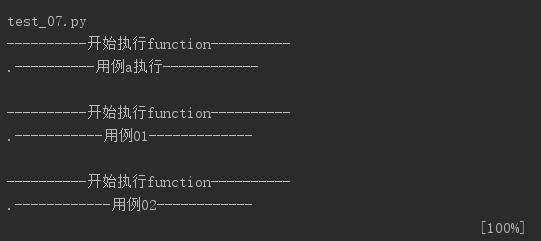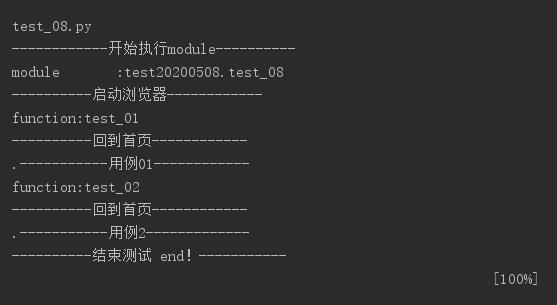python-pytest学习(十三)-fixture之autouse=True
Posted 给自己一个向前进的理由
tags:
篇首语:本文由小常识网(cha138.com)小编为大家整理,主要介绍了python-pytest学习(十三)-fixture之autouse=True相关的知识,希望对你有一定的参考价值。
一、前言
平常写自动化会写一些前置fixture操作,用例需要用到直接传该函数的参数名称就行了。当用例很多的时候,每次都传这个参数,会比较麻烦。
fixture里面有个参数autouse,默认是Fasle没开启的,可以设置为True开启自动使用fixture功能,这样用例就不用每次都去传参了。
调用fixture三种方法:
(1)函数或类里面方法直接传fixture的函数参数名称
(2)使用装饰器@pytest.mark.usefixtures()修饰
(3)autouse = True自动使用
二、用例传fixture参数
方法一:先定义start功能,用例全部传start参数,调用该功能
import time import pytest @pytest.fixture(scope="function") def start(request): print(\'\\n----------开始执行function-----------\') def test_a(start): print("-----------用例a执行----------") class Test_aaa(): def test_01(self,start): print(\'-----------用例01-----------\') def test_02(self,start): print(\'-----------用例02-----------\') if __name__=="__main__": pytest.main(["-s","test_06.py"])
运行结果:

三、装饰器usefixtures
方法二:使用装饰器@pytest.mark.usefixtures()修饰需要运行的用例
import time import pytest @pytest.fixture(scope="function") def start(request): print(\'\\n----------开始执行function----------\') @pytest.mark.usefixtures("start") def test_a(): print("----------用例a执行------------") @pytest.mark.usefixtures("start") class Test_aa(): def test_01(self): print(\'-----------用例01-------------\') def test_02(self): print(\'------------用例02------------\') if __name__=="__main__": pytest.main(["-s","test_07.py"])
运行结果:

四、设置autouse=True
方法三、autouse设置为Ture,自动调用fixture功能
(1)start设置scope为module级别,在当前.py用例模块只执行一次,autouse=Ture自动使用;
(2)open_home设置scope为function级别,每个用例前都调用一次,自动调用
import time import pytest @pytest.fixture(scope="module",autouse=True) def start(request): print(\'\\n------------开始执行module----------\') print(\'module :%s\'%request.module.__name__) print(\'----------启动浏览器------------\') yield print("----------结束测试 end!-----------") @pytest.fixture(scope="function",autouse=True) def open_home(request): print("function:%s \\n----------回到首页------------"%request.function.__name__) def test_01(): print(\'-----------用例01------------\') def test_02(): print(\'-----------用例2-------------\') if __name__=="__main__": pytest.main(["-s","test_08.py"])
运行结果:

上面是函数去实现用例,写进class里面也是一样可以的。
import time import pytest @pytest.fixture(scope="module",autouse=True) def start(request): print(\'\\n------------开始执行module----------\') print(\'module :%s\'%request.module.__name__) print(\'----------启动浏览器------------\') yield print("----------结束测试 end!-----------") class Test_aaa(): @pytest.fixture(scope="function",autouse=True) def open_home(request): print("function:%s \\n----------回到首页------------"%request.function.__name__) def test_01(): print(\'-----------用例01------------\') def test_02(): print(\'-----------用例2-------------\') if __name__=="__main__": pytest.main(["-s","test_08.py"])
以上是关于python-pytest学习(十三)-fixture之autouse=True的主要内容,如果未能解决你的问题,请参考以下文章